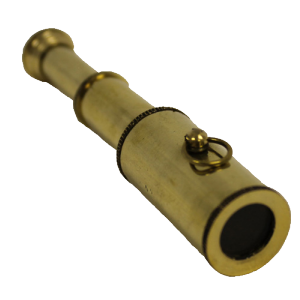Ask Professor Puzzler
Do you have a question you would like to ask Professor Puzzler? Click here to ask your question!
Anonymous asks, "What is telescoping sequence?"
Well, Anonymous, it's probably better to say "telescoping series," because the adjective "telescoping" refers to something that happens when you combine the terms, not the individual terms themselves. So I'll reword your question to "What is a telescoping series?"
First of all, when you see the phrase "telescoping," you shouldn't think of a normal telescope that you might see in an observatory. Instead, you should think of a spyglass, like this:

A telescoping series is like a spyglass, in that it looks long, but can be collapsed into something very small. When a spyglass is collapsed, the middle parts disappear, and all that's left is the two ends. The same is true of a telescoping series.
Here's an example. Consider the following series:
1/2 + 1/6 + 1/12 + 1/20 + 1/30 + 1/42 + 1/56 + 1/72 + 1/90 + 1/110
This looks rather intimidating to calculate if you don't have a computer or calculator to do the work for you; that's going to have one very large least common denominator!
But did you notice a pattern to the denominators? you could rewrite each of the fractions like this:
1/n(n + 1) (for example, 1/42 = 1/6(6 + 1).
But 1/n(n + 1) can also be written as follows: 1/n - 1/(n + 1). (Don't believe me? Do the algebra to combine the two fractions, and you'll see that it's true! Or use your calculator to test it out on a few values.)
So why is that useful to write the terms that way? Because it causes the series to "telescope" or collapse. Watch what happens when we rewrite each of the fractions this way:
1/2 = 1/1 - 1/2
1/6 = 1/2 - 1/3
1/12 = 1/3 - 1/4
1/20 = 1/4 - 1/5
and so forth, down to
1/110 = 1/10 - 1/11
Now what happens if you add all of those together?
(1/1 - 1/2) + (1/2 - 1/3) + (1/3 - 1/4) + ... + (1/10 - 1/11)
Notice that you have a positive 1/2, and a negative 1/2, which cancel. Similarly, the 1/3, 1/4,1/5, ect. fractions cancel out. Everything cancels out except the 1/1 at the beginning, and the 1/11 at the end.
So the sum is 1/1 - 1/11 = 10/11.
And I was able to calculate the sum in my head, without ever picking up a calculator, or writing on a sheet of paper. Obviously, telescoping series are pretty cool, and they can be useful in various areas of higher mathematics.
Thanks for asking!
Professor Puzzler


